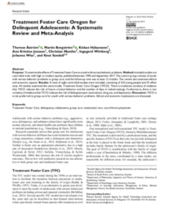Abstract
Purpose: To examine the effects of Treatment Foster Care on youth with serious behavior problems. Method: Included studies are controlled trials with high or medium quality, published between 1990 and September 2017. The control group consists of youth with serious behavior problems in group care, and the follow-up time was at least 12 months. The review also examines ethical and economic aspects. Results: A total of eight controlled studies were included, consisting of 633 young people and 55 effect sizes. All studies examined the same model, Treatment Foster Care Oregon (TFCO). There is moderate certainty of evidence that TFCO reduces the risk of future criminal behavior and the number of days in locked settings. Furthermore, there is low certainty of evidence that TFCO reduces the risk of delinquent peer associations, drug use, and depression. Discussion: TFCO is to be preferred to group care for youth with serious behavior problems. Ethical and economic implications are discussed.

